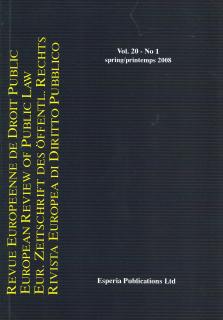
LA SÉCURITÉ EUROPÉENNE:
L'ÉTAT MEMBRE DANS L'ESPACE EUROPÉEN DE SÉCURITÉ
ÉTUDE DE CAS
(EUROPEAN SECURITY:
THE MEMBER STATE IN THE EUROPEAN AREA OF SECURITY
CASE STUDY)
ELEFTHERIA NEFRAMI
Professeur à l'Université Paris 13
Which is the place of the Member State in the European Area of Security? Is it possible to reconcile the security imperative with the protection of fundamental rights? Can the Member State be a State subject to the rule of law by meeting its obligation to execute the European security measures? These are the principal questions which the general report will try to answer, having as an inspiration the national rapporteurs' answers and studying successively the Member State's position vis-à-vis the European Union's actions in security matters and its adaptation to the needs of execution of European measures. Despite the Union's intervention in sensitive fields, the Member State is not deprived of its own competences, putting into perspective the pre-emptive effect of the European action, in particular in the external level. However, the autonomy of the State finds its limits in the framework resulting from the agreed transfer of competences and the progressive putting in place of a European security policy, whose effectiveness, and also legitimacy, can be disputed. Nonetheless, the Union's assertion in security matters is a reality by which the Member States must learn their lesson, in particular by adapting their apparatus to the needs of execution of the European law, by ensuring the integration and the transposition of the European norms, often to the detriment of the requirements of the national Constitution, and by contributing, through the national judge, to the balance between a uniform and firm security policy and the require¬ments of the rule of law. It must, however, be underlined that the indisputable impact of the European security policy on the Member State's status has a voluntary base and is materialised by the application of the duty to act in good faith, inherent to the member status. It remains to wish that the Member States and the Community judge will work on the proper balance between the security imperative and the protection of fundamental rights.
Quelle est la place de l'Etat membre dans l'espace européen de sécurité? L'impératif de sécurité est-il conciliable avec la protection des droits fondamentaux? L'Etat membre peut-il être un Etat de droit tout en s'acquittant de son obligation d'exécution des mesures européennes de sécurité? Ce sont les principales questions auxquelles le rapport général essaie de répondre, en s'inspirant des réponses des rapporteurs nationaux et en étudiant successivement le positionnement de l'Etat membre face à l'action de l'Union européenne en matière de sécurité et son adapta¬tion aux exigences d'exécution des mesures européennes. Malgré l'intervention de l'Union dans de domaines sensibles, l'Etat membre n'est pas dessaisi de ses propres compétences, l'effet préemptif de l'action européenne étant relativisé, notamment sur le plan externe. Certes, l'autonomie de l'Etat trouve ses limites à l'encadrement issu du transfert consenti de compétences et à la mise en place progressive d'une politique européenne de sécurité, dont l'effectivité, mais aussi la légitimité, pourraient être contestées. Il n'en demeure pas moins que l'affirmation de l'Union en matière de sécurité est une réalité dont les Etats membres devront tirer les conséquences, notamment en adaptant leur appareil aux besoins d'exécution du droit européen, en assurant l'intégration et la transposition des normes européennes, sou-vent au détriment des exigences de la Constitution nationale, et en contribuant, à travers la dynamique du juge national, à l'équilibre entre une politique de sécurité uniforme et solide et les exigences de l'Etat de droit. Il convient toutefois de souligner que l'impact incontestable de la politique européenne de sécurité sur le statut de l'Etat membre a une base volontaire et se matérialise par la mise en œuvre du devoir de loyauté, inhérent au statut de membre. Il reste à souhaiter que les Etats membres et le juge communautaire œuvreront pour le juste équilibre entre l'impératif de sécurité et la protection des droits fondamentaux.





















